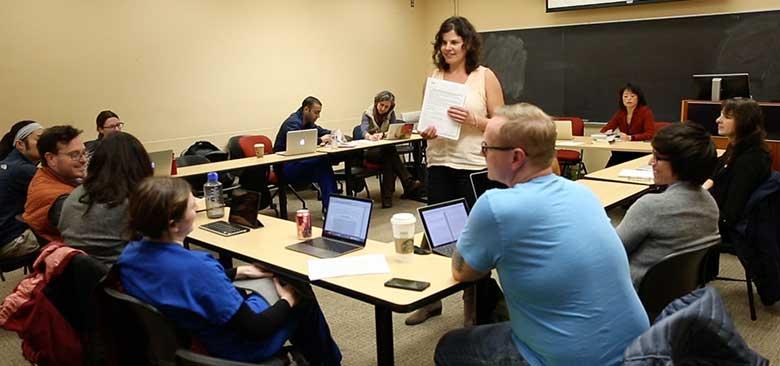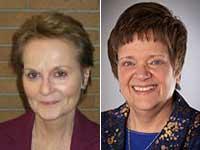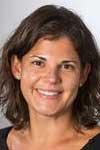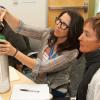
Elena Flowers, associate professor at the UCSF School of Nursing, teaches many of the School's genomics courses and serves on a UCSF committee designed to promote genomics education throughout the university. (Photo credit: Elisabeth Fall).
Preparing Nurses to Revolutionize Care Through Genomics
Rapid advances in genomics — the study of the genome, its interactions with other genes and one’s environment — hold the potential for improved health outcomes and are spurring nursing educators to prepare students in this evolving field.
Through a National Institutes of Health (NIH)-funded research training program and its master’s curriculum, the UCSF School of Nursing is working to equip its future nurse leaders with critical genomics knowledge that can lead to research breakthroughs and improve health for communities.
“The reward for taking these courses is huge,” said Kate Oppegaard, a first-year PhD student at the School. “They’re very relevant and applicable to clinical practice, and really changed the course of my nursing career."
Seeking Answers for the Underserved
 Sandra Weiss, Christine Miaskowski The emphasis on genomics is increasing in the School’s Biobehavioral Research Program in Symptom Science, where seven PhD students and three postdoctoral scholars are mentored by some of nursing’s top researchers, including program co-directors Christine Miaskowski and Sandra Weiss. They are investigating how to mitigate the severity of symptoms from common diseases such as cancer.
Sandra Weiss, Christine Miaskowski The emphasis on genomics is increasing in the School’s Biobehavioral Research Program in Symptom Science, where seven PhD students and three postdoctoral scholars are mentored by some of nursing’s top researchers, including program co-directors Christine Miaskowski and Sandra Weiss. They are investigating how to mitigate the severity of symptoms from common diseases such as cancer.
Thanks to supplemental funding from the National Institute of Nursing Research and the NIH Human Genome Research Institute, faculty members have created innovative genomics workshops on candidate gene analysis, gene expression and the use of non-invasive biospecimens to analyze DNA. These workshops have deepened participants’ knowledge in genomics and sparked innovative ideas they have applied to their research.
“They walk you through an analysis from start to finish,” Oppegaard said. “When I was first reading genomics, it seemed abstract. But they do an  Kate Oppegaard incredible job of making genomics research feel within reach.”
Kate Oppegaard incredible job of making genomics research feel within reach.”
That specialized training has helped Oppegaard, an oncology nurse training for a career in research, examine co-occurring cognitive impairment, anxiety and depression in individuals receiving chemotherapy. Utilizing data from one of Miaskowski’s previous studies, Oppegaard is evaluating for differences in gene expression. The goal is to connect certain groups of genes with symptoms and identify targets for interventions to curb those symptoms.
Postdoc Sarah Richoux is leveraging data from one of Weiss’s studies to assess the relationship between stress levels of pregnant women and adverse birth outcomes.
Utilizing salivary samples collected from 4-week-old infants, Richoux is examining epigenetic changes on stress-related genes. She has partnered with a lab at UC Berkeley that will extract DNA from these samples and perform a process called methylation EPIC array to determine whether genes associated with the hypothalamus-pituitary-adrenal axis are differentially methylated among infants with adverse birth outcomes.
 Sarah Richoux “There’s data that shows some infants who have differences in DNA methylation of stress-related genes are born smaller at birth and, later in life, face a greater burden of health challenges,” Richoux said. “Stress seems to be an underlying component to behavioral challenges and looking at these genes may give some more insight into that line of work.”
Sarah Richoux “There’s data that shows some infants who have differences in DNA methylation of stress-related genes are born smaller at birth and, later in life, face a greater burden of health challenges,” Richoux said. “Stress seems to be an underlying component to behavioral challenges and looking at these genes may give some more insight into that line of work.”
Gaining a Mastery of Genomics
Meanwhile, students in the Master of Science Program can choose to explore genomics through its core course, or they can take three courses together as part of the Genomics Concentration. The offerings range from introductory to advanced courses on the clinical applications of genomics as well as its policy and legal issues.
The courses are instructed by associate professor Elena Flowers and assistant professor Kord Kober, who operate labs at the School where faculty and students leverage genomics data and resources to conduct studies on diabetes, cancer, reproductive care, health impacts on LGBTQ communities and other conditions affecting underserved populations.
Flowers serves on UCSF’s Institute of Human Genetics Education Committee, which was established to promote genomics education throughout the university. That experience has provided her a unique view of genomics education at UCSF and the challenges in equipping faculty with the tools to advance it.
“Faculty are interested, but there are barriers to leveraging existing resources and finding helpful new ones to help them integrate genomics into clinical settings,” said Flowers,  Elena Flowers the committee’s only nursing representative. “It’s a huge challenge that all disciplines are facing.”
Elena Flowers the committee’s only nursing representative. “It’s a huge challenge that all disciplines are facing.”
Despite these challenges, Flowers’ and Kober’s courses have attracted students from a variety of specialties within the master’s program. The students believe gaining proficiency in genomics is crucial to their development as nurses.
“When we look at how to solve future health issues, many of the answers lie in genomics,” said Catherine Nguyen, a second-year master’s student in the Psychiatric Mental Health Nurse Practitioner (PMHNP) specialty.
Vanessa Simmons, a first-year master’s student in the PMHNP specialty, foresees genomics providing more tangible answers in treating mental health.
“A lot of the drugs used aren’t super targeted and we still don’t know exactly how they work,” Simmons said. “[Discoveries in] genomics would be huge in understanding treatment and prevention.”
The students cautioned that relying solely on data can’t provide all the answers, but recent genomics advances are offering inventive strategies to help solve some of health care’s greatest challenges.
“There are a lot of environmental factors and epigenetic changes to account for,” said Nadia Haas, a master’s student in the Adult Gerontology-Primary Care Nurse Practitioner specialty. “As clinicians, we need to look at the whole picture. Genomics is burgeoning and it’s exciting to be a part of it.”



